How to Empower Kids With The Emotional Skills They Need To Be Amazing Students
Inside: Simple ways that school social workers and school counselors can help kids learn emotional skills and nurture their social-emotional well-being.
In theory, school social workers should have time to support children’s social emotional development.
After all, a core responsibility of school social workers is to help kids achieve academic success. It’s been proven that children who can manage their emotions, make good decisions, and build positive relationships, tend to thrive academically. It seems like a no brainer then that teaching social emotional skills would be top priority
Not quite! Finding time to teach kids’ social emotional skills is difficult when you’re drowning in the demands of school social work. Often, your caseload is too high, you’re the go-to person in a crisis, and you’re swamped in never-ending paperwork. (Were you prepared for all the documentation? I sure wasn’t!)
When I started out as a school social worker, I wanted to prove that I could handle the demands of the job.
Staff: Yanique can you cover recess, they need an extra set of hands.
Me: Sure, no problem.
Staff: Yanique, there was a fight on the bus, can you see what happened and follow up with parents?
Me: Sure, no problem.
Staff: Yanique, Jane Doe is being disrespectful and disrupting the class, can you come talk to her?
Me: Sure, no problem.
It didn’t matter that I was struggling to find time to meet kids already on my caseload, or that some requests were unrelated to school social work. My knee jerk response was always, sure, no problem!

Almost immediately I felt overwhelmed and burnt out. Fortunately, I had the support and wisdom of a few veteran social workers. I felt inspired by their encouragement and came up with systems to simplify my work-flow. This allowed me to support kids’ social emotional development, save time, and not feel burned out.
I believe even the busiest school social worker can make a difference in children’s social emotional well-being–without sacrificing their own emotional health. I can show you how.
Bonus: As a bonus for joining the Kiddie Matters community, get the social emotional development checklists and the How Can I Help Kids (and Adults) Practice SEL Skills cheat sheet.
- But first, what is social emotional development anyway
- Why does kids’ social emotional well-being matter?
- Simple ways to support kids’ social emotional health
- How can I support children’s social emotional development directly?
- How can I help support children’s social emotional development schoolwide?
- How can I help school staff support children’s social emotional development?
- How can I help parents and caregivers support kids’ social emotional development?
- What are some challenges to supporting children’s social emotional development?
But first, what is social emotional development anyway
Social emotional development is the life-long process through which children and adolescents develop essential skills they need to build positive relationships, solve conflicts, and identify and cope with big feelings. According to the Collaborative for Academic, Social and Emotional Learning (CASEL), there are five core social emotional domains that we need to be competent in. They include:
Self-awareness: The ability to understand your thoughts, emotions, strengths, weaknesses, and values and how they influence your behavior across contexts. Self-awareness skills includes:
- Identifying and expressing your feelings
- Recognizing your strengths and challenges
- Having an accurate self-perception and self-confidence
- Practicing a growth mindset
Self-management: The ability to regulate your emotions, manage stress, set and achieve goals, and maintain focus and motivation. Self-management skills include:
- Controlling impulses
- Managing stress effectively
- Showing motivation
- Setting and meeting goals
- Using executive functioning skills (planning, organization, etc.)
Social awareness: The ability to cultivate empathy and understand other people’s point of view in order to build positive relationships and navigate social situations. Social awareness skills include:
- Taking different perspectives
- Appreciating diversity
- Respecting others and showing empathy
- Understanding social norms
- Recognizing available supports and resources (i.e. family, school, and community)
Relationship skills: The ability to learn effective communication, conflict resolution, and cooperation skills in order to establish and maintain healthy connections with others. Relationship skills include:
- Communicating effectively
- Cooperating with and listening to others
- Resisting peer pressure
- Asking for and providing help when it’s needed
- Negotiating and resolving conflict
Responsible decision-making: The ability to make choices that align with your personal values, consider the well-being of yourself and others, and contribute positively to the community. Responsible decision making skills include:
- Identifying and analyzing problems and situations
- Solving problems as they come up
- Evaluating and reflecting on the consequences of your actions
- Taking responsibility for your decisions and the outcomes
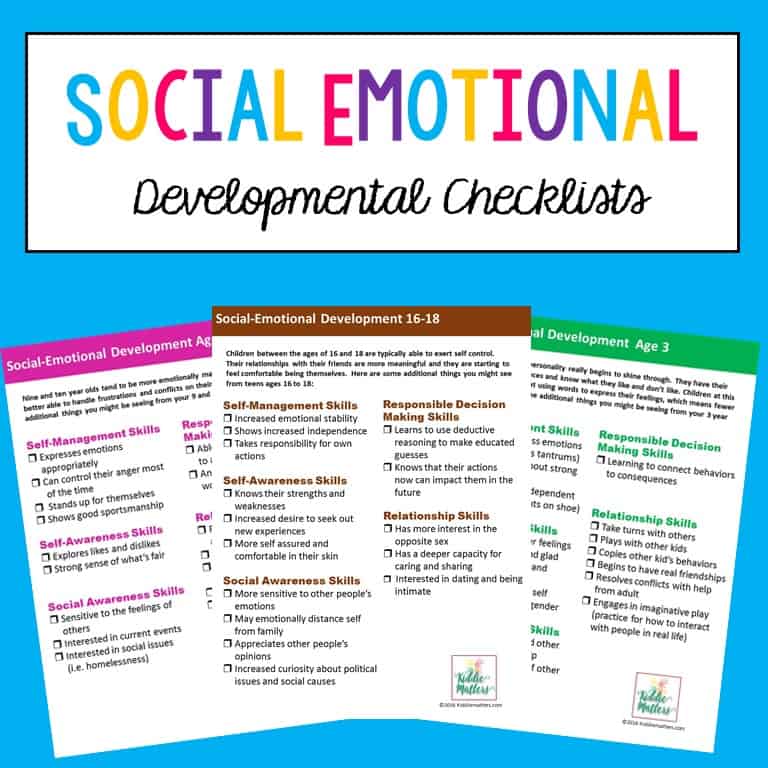
Why does kids’ social emotional well-being matter?
CASEL states that children’s social emotional learning is important because “it lays the foundation for how they learn to understand and manage emotions, set and achieve positive goals, feel and show empathy for others, establish and maintain positive relationships, and make responsible decisions.” Research indicates that children with strong social emotional skills tend to:
- Be happier
- Show greater motivation to learn
- Have a more positive attitude toward school
- More eagerly participate in class activities
- Demonstrate higher academic performance than less mentally healthy peers
- Listen and follow directions
- Have close relationships with caregivers and peers
- Care about friends and show interest in others
- Recognize, label, and manage their emotions
- Understand others’ emotions and show empathy
- Express wishes and preferences clearly
- Can easily join in ongoing play and group activities
- Able to play, negotiate, and compromise with others
On the other hand, children with limited social emotional skills tend to struggle with following directions and participating in learning activities. They also have a hard time coping when faced with challenges or conflict Additionally, these kids tend to struggle more than their peers socially and are more likely to be rejected by classmates, have low self-esteem, do poorly in school, and be suspended. In worst case scenarios, some kids drop out.
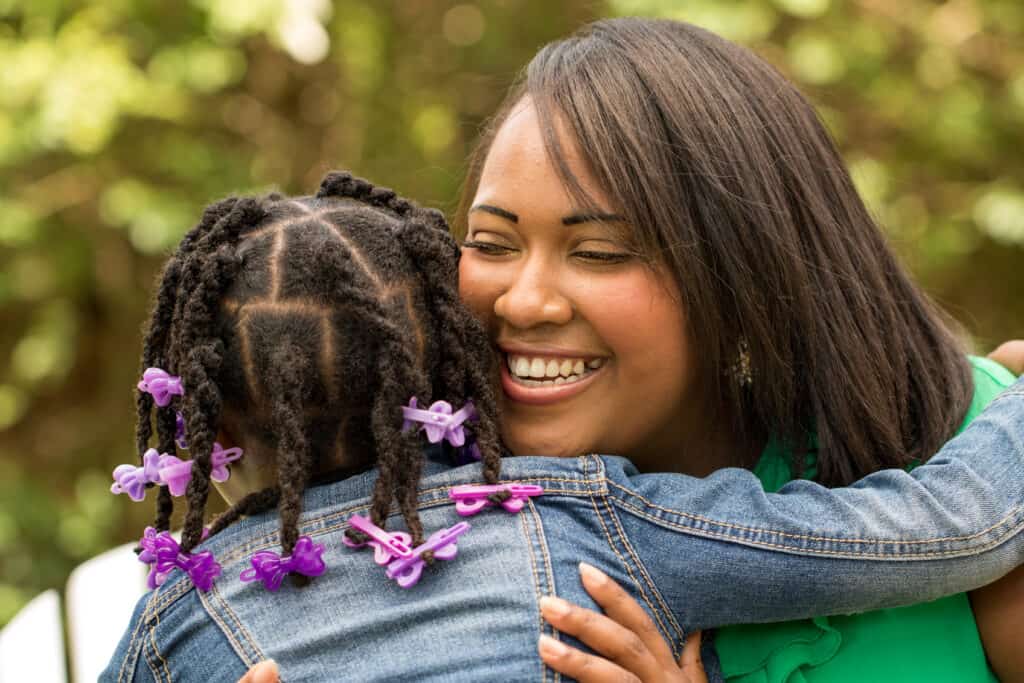
Simple ways to support kids’ social emotional health
School social workers make a difference in children’s social emotional development by empowering them with the social emotional skills they need to grow into emotionally healthy, successful adults. You have a unique role in fostering kids’ social emotional well-being because you’re the link between school, home, and community.
Here are a few simple ways even the busiest school social worker can support children’s social emotional development across different domains.
How can I support children’s social emotional development directly?
- Explore different social emotional learning frameworks. Consider the wide range of SEL skills that your kids might benefit from learning, in addition to CASEL’s five core competencies. The Explore SEL website by the Ecological Approaches to Social Emotional Learning (EASEL) Lab at the Harvard Graduate School of Education is a helpful place to start.
- Complete needs assessments. Determine what social emotional skills the kids you serve already have and the social emotional skills they need to further develop. Get the social emotional development checklists to guide your assessment. This way you’ll be addressing the needs of your kids instead of teaching skills at random.
- Plan and prepare social emotional skills training group lessons. One of the best ways to teach kids social emotional skills is through direct skills training. This can be done effectively through small group counseling sessions. Using small groups will save you time and allow you to meet the social emotional needs of more kids. There’s one caveat—organizing counseling groups can take time to set up. The upside is that once you put the work in upfront to plan groups, you can use them year after year or multiple times a year.
- Model talking about your own feelings. When appropriate, talk to kids about your own feelings and how they’ve changed over the course of the day. Use specific words to describe how you’re feeling. When you label and describe your feelings, it lets kids know that it’s okay to talk about feelings. You can take it one step further and not only talk about how you’re feeling, but share how you’re coping or going to cope with your feelings. For example:
I’m feeling nervous about talking in front of a group. I’m going to do some deep breathing to relax.
- Validate children’s emotions. It’s important to let children know that their feelings are OK and that there are no good or bad feelings. Actively listen to children when they talk about their feelings. Help them learn the vocabulary to label their emotions as they experience them. Here are some examples of helpful validating statements :
I’m sorry you had to go through that
It makes sense that you feel/think…
What you are thinking/feeling is normal
I would feel that way too if I were in your situation
I appreciate that you feel comfortable enough to share this with me
I can understand why you feel that way
That must have been really hard for you
After hearing these summaries a few times, kids typically are able to more easily label and describe what they’re feeling on their own. Once children develop a better understanding of their emotions, they’re more likely to use they’re coping skills to handle stressful situations.
- Encourage kids with meaningful feedback and avoid empty praises. When we use empty praises (i.e, Good job! You’re so smart!) to express to children that we are proud of them, they don’t get an opportunity to form their own opinions about their choices and accomplishments. Instead, they look to others to define for them what achievements are acceptable and unacceptable. It turns out that encouraging children with meaningful feedback is far more powerful than smothering them with empty praises. You can encourage children through making observations about and acknowledging their efforts. For example, “you worked really hard preparing for your test” or “your effort and hard work paid off.” Check out these 25 encouraging phrases you can say to kids to promote a growth mindset
How can I help support children’s social emotional development schoolwide?
Research shows that social emotional learning needs to be schoolwide to have a significant impact. It’s not enough to just teach kids social emotional skills during once a week counseling sessions or whole class SEL lessons. Social emotional learning needs to be embedded in daily routines and structures. Check out these easy ways to help promote social emotional learning schoolwide. You can:
- Have daily social emotional learning themes and put a challenge out for kids to complete. (Mindfulness Mondays-challenge kids to practice mindfulness activities, etc.)
- Encourage all adults in the school building to reinforce kids’ using I-Messages, (I feel…when you…”), to express their feelings.
- Offer to lead a Mindful Minute during morning announcements one day a week
- Create a schoolwide calming room. This will serve as a supportive, therapeutic space for children to relax and self-regulate when they’re experiencing big feelings.
- Run a social emotional learning theme door decorating contest or poster contest.
How can I help school staff support children’s social emotional development?
Helping other educators find ways to encourage children’s social emotional growth is no easy task. Here are some simple ways you can support other educators with teaching social emotional skills:
- Recognize and validate what they’re already doing. Acknowledge the ways school staff is currently promoting social emotional learning. For instance, maybe they’re good at establishing relationships or resolving conflicts in their classroom
- Collaborate with educators on social emotional learning initiatives. For example, pick a theme/topic each month (mindfulness, friendship, empathy, etc.) Share simple activities and/or books on the theme with teachers so they can cover the topic in their classroom. You could also plan monthly classroom push-ins to support the teacher with these
- Provide staff with evidence-based social emotional learning resources. Share information that will help them to better understand factors affecting a student’s performance and behavior (cultural, societal, economic, familial, health, etc.)
- Facilitate a social emotional learning professional development session for staff: Help staff develop a better understanding of social emotional learning by leading a professional development session discussing SEL. Here’s a handy cheat sheet to remind school staff of how they can support social emotional development by working on their own social emotional learning skills!
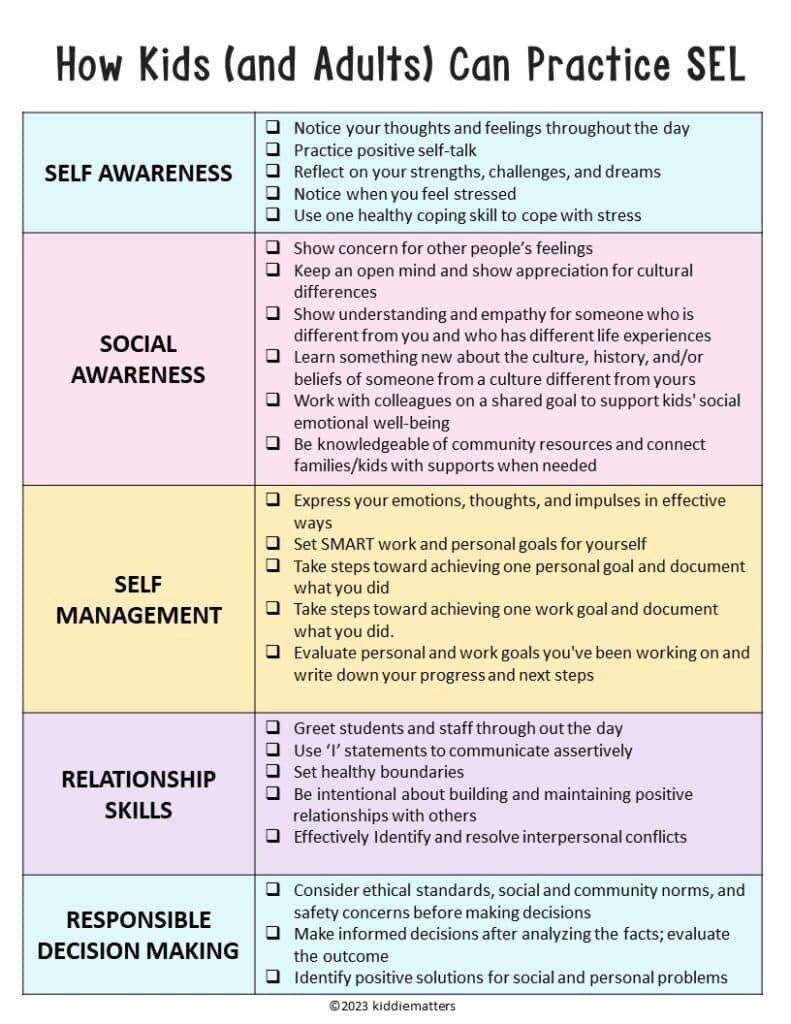
- Establish SEL staff check-ins (i.e. Teacher Tuesday). Set aside a specific day and time to meet with staff, for instance the 1st Tuesday of each month. Encourage teachers to stop in during that time. They can discuss any concerns they’re having with supporting kids’ social emotional well-being. If no teachers show up, then you have time to work on documentation!
- Drop into classrooms to relieve teachers for five minutes. Sometimes all a teacher needs is a bathroom/water break or a minute to breathe and get grounded
- Conduct a survey. Send a survey out asking school staff how you can help them better support kids’ social emotional needs
- Plan staff events. Depending on what your school and budget allows, you can get pretty creative with this. One school social worker organized to have an after school petting zoo for staff and family. It was a hit with both kids and adults!
- Create health and wellness incentives. If your school has a gym, open cardio and weight room for staff. Reach out to local gyms to see if they’re willing to give discounts to school staff. We don’t need another PD to learn about self-care. We need time and resources to practice self-care
How can I help parents and caregivers support kids’ social emotional development?
Although empowering kids with social emotional skills in school is invaluable, it’s important that these skills are reinforced at home as well. You can help parents and caregivers nurture children’s social emotional health by doing the following:
- Provide families information on social emotional development, social emotional learning, as well as information on your role in supporting their children’s social emotional well-being.
- Create and share social emotional learning tips and cheat sheets with parents and caregivers (i.e. growth mindset phrases parents can use to encourage kids)
- Share coping strategies discussed and practiced in session
- Share self-care strategies and encourage parents/caregivers to model these for their children.
- Create a pamphlet of community social emotional development resources that families can access, or provide a link to resources on your school website.
What are some challenges to supporting children’s social emotional development?
Even though we know the many benefits of nurturing children’s social emotional health, the reality for many school social workers is that there are several barriers that get in the way of them supporting kids’ social emotional well-being. These challenges include:
- Lack of time and resources. Remember all the demands of school social work we talked about earlier? Oh the documentation of it all!
Pro-tip Find low cost, ready to use, evidence based, social emotional learning curriculum that comes with lesson plans. This will save you time and provide you with the resources you need to empower your kids with essential social emotional skills.
- Lack of support from colleagues and administration. Not everyone sees the benefits of social emotional learning or they misunderstand what it is. In order for kids to internalize social emotional skills, these skills need to be reinforced in classrooms and at home. There has to be ‘buy’ in from parents, teachers, and administrators for skills training to have a significant impact on kids’ social emotional well-being.
Pro-Tip: Provide opportunities for parents, colleagues, and administrators to learn more about social emotional learning and the benefits of kids developing these skills. Bonus if you have data to show how SEL initiatives impact your school community.
- Stress and burnout. The demands of being a school social worker can leave you feeling stressed and demoralized. You don’t always have the resources or support that you need. You might start to question if you have what it takes to make a difference in children’s lives. When school social workers are stressed, they tend to stop practicing regular self-care and are less likely to model effective stress management skills.
Pro-tip: School social workers can make a difference in children’s social emotional well-being without burning themselves out. It’s important that you prioritize self-care and practice healthy stress management. Take an audit of how you spend your time and look for ways you can use your time more efficiently. Share your workload concerns with administration and use data to advocate for more support.
- Lack of student readiness. A key challenge to teaching children social and emotional skills is their readiness to learn these skills and their ability to stay engaged while doing so.
Pro-tip: Meet kids where they’re at developmentally. Focus on empowering them with social emotional skills that are culturally and developmentally appropriate for them. It’s helpful to complete a needs assessment to get clarity into what skills the kids you serve are strong in and what skills need further development.
- Equity isn’t addressed in social emotional curriculum. According to a brief, here are very few social emotional learning programs intentionally designed with equity in mind and even fewer examine how historical and structural inequalities impact both the teaching and learning of SEL skills. It’s important that SEL programs address the diverse cultures, identities, and experiences of all students in the classroom, including students of color and other youth impacted by structural inequality.
Pro-tip: Build a strong, respectful relationship with kids founded on an appreciation of their similarities and differences. Encourage children to develop a sense of self that includes their cultural values, ethnic racial groups, socioeconomic status, and gender. Additionally, learn and find ways to empower kids to critically examine root causes of inequity and how to work with others to find solutions to community and societal problems. - Lack of trauma informed practices. Research shows that roughly 70% of children in school settings report experiencing at least one traumatic event before age 16. Kids who experience trauma can be silent sufferers. They bottle up their feelings because they don’t have the vocabulary to describe their experiences, or because fear and/or shame prevents them from opening up. Some kids externalize their feelings and it shows up as aggression, anger, or fear. What we see as negative behaviors might in reality be a trauma response.
Pro-tip: Since we don’t always know which children experienced trauma, it’s important to use trauma-informed practices with all children and to provide universal, trauma-informed supports in all classrooms and throughout the school community. We do this by creating safe, predictable environments for children to succeed in.
- Mental health challenges. According to the Centers for Disease Prevention and Control, poor mental health among children continues to be a significant public health concern. Attention-deficit/hyperactivity disorder (ADHD), anxiety among children of all ages, and symptoms related to depression among adolescents, are the most common concerns.
Mental health problems can affect children and adolescent’s energy level, concentration, mental ability, confidence, behavior, and academic performance. The increased number of children experiencing mental health problems diversifies the SEL skills that need to be developed. Unfortunately, school social workers often don’t have the time or resources to meet this increased need. - Pro-tip: Social emotional learning cultivates protective factors to buffer against mental health risks. Offer evidence-based SEL programming and practices as a universal, strengths-based Tier 1 support to promote the healthy development, resilience, and well-being of all children.
The demands of school social work can definitely get in the way of social workers being able to support kids’ social emotional development. You can spend half the year just catching up on paperwork! So I get it. The last thing you need is one more task to add to your to do list. And yet, if you want to make a difference in kids’ social emotional well-being, the time to do so is NOW!!! What can you do to support children’s social emotional well-being today?
Sources
Bradberry, T., & Greaves, J. (n.d.). Emotional intelligence 2.0
http://www.cdc.gov/ncbddd/actearly/milestones/index.html
https://www.psychologytoday.com/blog/great-kids-great-parents/201211/self-awareness
http://www.zerotothree.org/child-development/social-emotional-development/social-emotional-development.html
http://www.pbs.org/parents/childdevelopmenttracker/three/socialandemotionalgrowth.html
http://psychology.about.com/od/early-child-development/a/social-and-emotional-milestones.htm
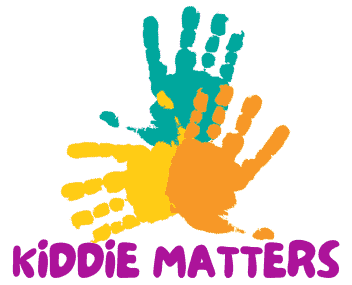

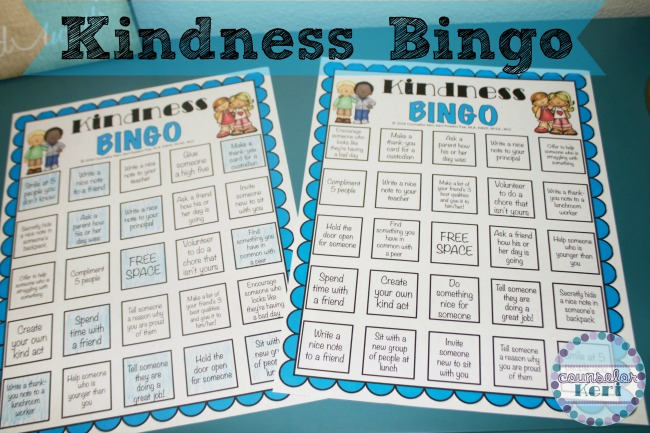
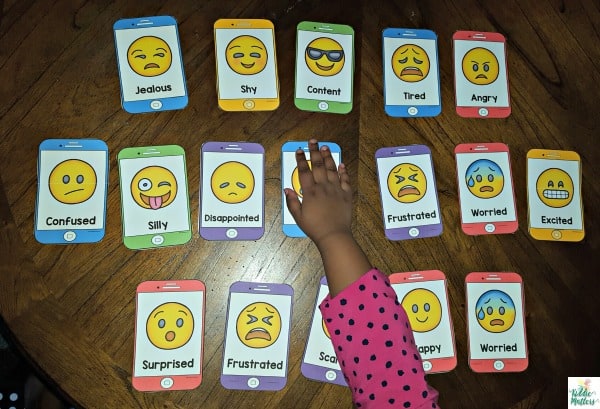


thanks for sharing this!!